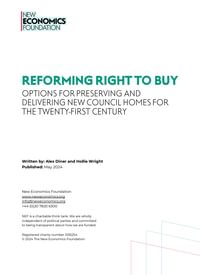Reforming right to buy
Options for preserving and delivering new council homes for the twenty-first century
10 May 2024
Over almost four and a half decades since its introduction in 1980, the right-to-buy scheme has had a transformative impact on our homes and our lives. Over two million homes have been sold to around 4.5m sitting tenants, allowing them to own their own homes and access wealth to which they had hitherto been denied. For those who have benefitted from the scheme and for those who one day hope they might, right to buy offers a clear path to gaining financial security for them and their children, with greater control over their future as a result.
There is a clear tension, however, between right to buy’s enduring appeal on the one hand, and its role in reducing the number of homes for social rent, which lies at the heart of our housing crisis. Right to buy has come at the huge cost of emaciating what had been one of the UK’s greatest national assets: its social housing stock.
The strings attached to right to buy have bound councils’ hands, preventing them from replacing sold homes. Moreover, it has triggered a seismic loss of confidence and ability on the part of local authorities to build new homes. Partly because of the impact of right to buy, councils went from being at the vanguard of developing new homes in the decades immediately following the Second World War, to being bit-part players thereafter.
The task for policymakers is to navigate a path that recognises the role that right to buy has played in providing low-cost home ownership while reforming the policy to strike a better balance. The goal of these reforms should be to reform right to buy so that, instead of contributing to this current housing crisis, it can become part of the solution to it.
This report outlines a package of reforms underpinned by a suite of powers that should be devolved from Westminster to local government. These would give councillors the ability to make decisions regarding the future of their council housing stock and give them greater control over the tenure balance of homes in their area. England’s current one-size-fits-all approach to right to buy has exacerbated affordable housing shortages in high-demand areas. Devolving right to buy to councils, however, would place more decision-making powers and accountability in the hands of local politicians, who know their areas best. It would also help them to capture the multiple benefits of devolution. Crucially, by reforming right to buy so that one of the key barriers to council housebuilding is removed, councils can deliver local economic growth while better addressing local housing needs. Powers should therefore be devolved to allow councils, if local circumstances demand, to:
- suspend right to buy where it can be demonstrated that the policy is contributing to affordable housing shortages;
- end right to buy in respect of newly built or acquired homes;
- prevent sold homes from being let in the private rented sector (PRS); and
- reduce discounts and extend qualifying periods beyond the pre-2012 levels, which should be returned to as a new baseline across the country.
Furthermore, Treasury rules should be amended to allow councils to use receipts to better provide replacement stock:
- The Treasury Share should be abolished.
- The cap on the use of receipts should be abolished.
- Councils should be allowed to combine receipts with other forms of grant funding.
- Councils should be permitted to transfer receipts to Arms Length Management Organisations (ALMOs) and housing companies.
- The cap on using receipts to acquire homes on the open market should be lifted.
Underpinning the Treasury’s justification for imposing restrictions on the use of receipts is a scepticism that, left to their own devices, councils will fail to replace sold homes. The risk of councils misusing these additional powers is minimal. Crucially, it is the current rules themselves that are preventing councils from replacing sold homes.
This report highlights a wide range of reform options for the government so that right to buy is fit for purpose in the current housing crisis. Devolving right-to-buy powers will help councils tailor it to local circumstances while giving them the confidence to get building again. It should therefore be a pre-requisite and priority for any government seeking to rapidly upscale social housing delivery and provide a path out of the housing crisis.
Campaigns Homes For Us
Topics Housing & land







